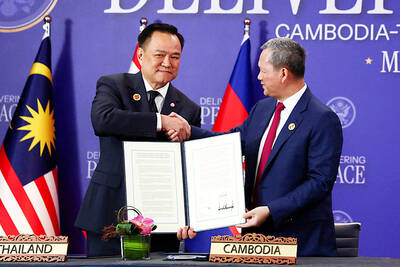India’s foreign minister addressed Chinese students at an elite Peking University yesterday, the second day of a visit aimed at boosting trade and cooperation despite a lingering border dispute and concern in New Delhi over China’s rising assertiveness.
China’s Foreign Ministry barred access to the speech by reporters from the Associated Press, but did not say why.
India’s relations with China have recently entered a sensitive period because of sharpening economic rivalries, lingering arguments about the border and unrest in Tibet, the Chinese-controlled Himalayan region on the Indian border.
India hosts the Dalai Lama’s Tibetan government-in-exile, which is accused by Beijing of orchestrating sometimes deadly rioting in Tibetan areas of China earlier this year. The Dalai Lama, Tibet’s exiled Buddhist leader, denies the accusations.
On Thursday, Foreign Minister Yang Jiechi (楊潔箎) told his visiting Indian counterpart Pranab Mukherjee that relations between the two countries were “at the best period of development in history” and faced “important strategic opportunities,” Xinhua news agency reported. The combined populations of the two countries make up a third of humanity.
Indian diplomats said the sides agreed to exchange data on seasonal water flows in cross-border rivers, including Brahmaputra, one of Asia’s largest rivers and which originates in Tibet, where it is known as the Yarlung Zangbo.
Xinhua made no mention of the rival territorial claims dating from a brief but bloody border war in 1962, although such issues featured heavily in independent Indian media reports on the visit.
Beijing claims India’s northeastern state of Arunachal Pradesh.
China occupies a large chunk of territory that India considers part of its Jammu and Kashmir region, and it says its border with the Indian-controlled region of Sikkim has yet to be demarcated.
Eleven rounds of talks on settling the dispute have made scant progress. Chinese officials said earlier that the two foreign ministers would touch on border issues at their meeting, but there was no immediate indication whether it came up.
Mukherjee opened a new Indian consulate in the southern city of Guangzhou on Thursday and was scheduled to meet with Premier Wen Jiabao (溫家寶) before his three-day visit ends today.
India has repeatedly expressed concerns that Chinese troops have been making incursions over the de facto border, an issue that was discussed during Indian Prime Minister Manmohan Singh’s visit to Beijing in January, with no apparent result.
China, meanwhile, has expressed dissatisfaction with India’s decision to reopen an air base near the Chinese border in the Ladakh region.
Along with the border dispute, some in India have also expressed concerns about China’s warming ties with neighboring countries on the Indian Ocean, especially Pakistan, India’s traditional rival.
Beijing has sought to soothe the Indian concerns, saying rising trade and exchanges point to an overall improvement in relations.
Two-way trade grew to US$37 billion last year, with the balance heavily in China’s favor, and is targeted to rise to US$60 billion by 2010.

Shamans in Peru on Monday gathered for an annual New Year’s ritual where they made predictions for the year to come, including illness for US President Donald Trump and the downfall of Venezuelan President Nicolas Maduro. “The United States should prepare itself because Donald Trump will fall seriously ill,” Juan de Dios Garcia proclaimed as he gathered with other shamans on a beach in southern Lima, dressed in traditional Andean ponchos and headdresses, and sprinkling flowers on the sand. The shamans carried large posters of world leaders, over which they crossed swords and burned incense, some of which they stomped on. In this

‘NO COUNTRY BUMPKIN’: The judge rejected arguments that former prime minister Najib Razak was an unwitting victim, saying Najib took steps to protect his position Imprisoned former Malaysian prime minister Najib Razak was yesterday convicted, following a corruption trial tied to multibillion-dollar looting of the 1Malaysia Development Berhad (1MDB) state investment fund. The nation’s high court found Najib, 72, guilty on four counts of abuse of power and 21 charges of money laundering related to more than US$700 million channeled into his personal bank accounts from the 1MDB fund. Najib denied any wrongdoing, and maintained the funds were a political donation from Saudi Arabia and that he had been misled by rogue financiers led by businessman Low Taek Jho. Low, thought to be the scandal’s mastermind, remains

Near the entrance to the Panama Canal, a monument to China’s contributions to the interoceanic waterway was torn down on Saturday night by order of local authorities. The move comes as US President Donald Trump has made threats in the past few months to retake control of the canal, claiming Beijing has too much influence in its operations. In a surprising move that has been criticized by leaders in Panama and China, the mayor’s office of the locality of Arraijan ordered the demolition of the monument built in 2004 to symbolize friendship between the countries. The mayor’s office said in

FIGHTING CONTINUES: Thai military dropped 40 bombs on border areas, Cambodia said, while Bangkok said Phnom Penh launched heavy attacks and damaged homes Cambodia yesterday accused Thailand of intensifying its bombardment of disputed border areas, even as officials from the two countries attend a multi-day meeting aimed at negotiating an end to deadly clashes. The neighbors’ long-standing border conflict reignited this month, shattering an earlier truce and killing more than 40 people, according to official counts. About 1 million people have also been displaced. Cambodian and Thai officials were in their third day of talks at a border checkpoint, with ministers of defense from the two countries scheduled to meet today. However, the Cambodian Ministry of National Defense said Thailand’s military carried out a heavy